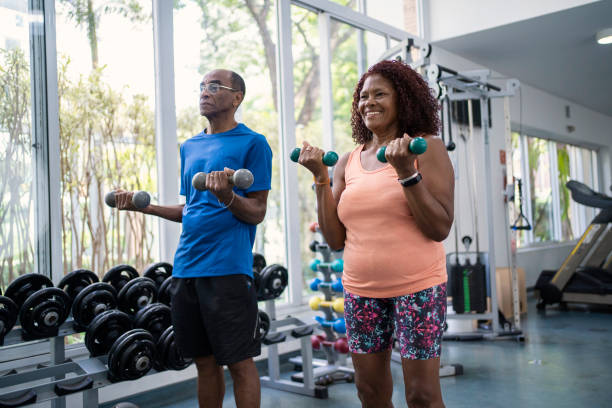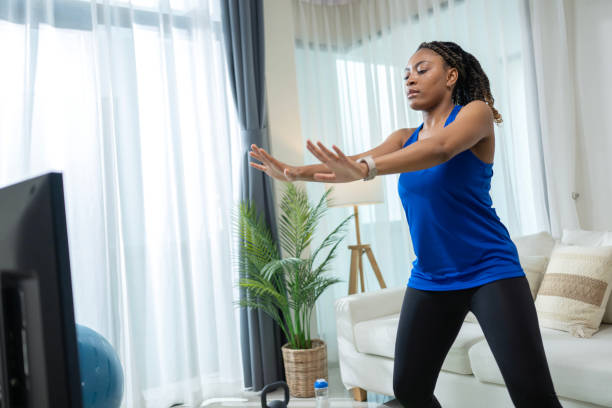(BlackFitness101.com) As a fitness trainer, I’ve seen firsthand how regular physical activity transforms not only the body but also the mind. Many people come to me with goals centered around weight loss, muscle gain, or improving overall health. While these are certainly important, one often overlooked benefit of exercise is its profound impact on cognitive abilities—particularly memory and thinking skills. When clients discover this mental boost, it often becomes an additional motivating factor for them to stick with their fitness journey.

The Connection Between Exercise and Brain Health
The relationship between exercise and cognitive function is supported by a growing body of scientific research. Engaging in regular physical activity helps stimulate the brain, resulting in better memory retention, improved problem-solving skills, and even enhanced creativity. Whether you’re a student looking to improve academic performance or an older adult hoping to stave off memory-related decline, exercise plays a pivotal role in sharpening the mind.
But how exactly does exercise influence brain health? The brain, like any other organ in the body, requires proper circulation, oxygenation, and stimulation to function at its best. Regular physical activity facilitates this by promoting various biological processes that enhance brain health.
Exercise Improves Blood Flow to the Brain
One of the primary ways exercise boosts cognitive function is by increasing blood flow to the brain. The brain depends on oxygen-rich blood to function optimally, and during physical activity, the heart pumps more blood throughout the body. This increase in circulation delivers vital nutrients to the brain, ensuring that it operates more efficiently.
Increased blood flow doesn’t just help with thinking in the moment—it also has long-term benefits. The enhanced circulation helps with the formation of new blood vessels, contributing to better overall brain health. In fact, some studies have suggested that this process may even reduce the risk of developing cognitive disorders like Alzheimer’s disease.
Neurogenesis: Building a Smarter Brain
In addition to increased blood flow, exercise also promotes the growth of new brain cells—a process known as neurogenesis. For years, it was believed that humans were born with all the brain cells they would ever have, but recent research has shown that this isn’t the case. Physical activity, particularly aerobic exercise, can actually stimulate the production of new neurons in the hippocampus, the part of the brain responsible for memory and learning.
This means that when you engage in activities like running, cycling, or swimming, you’re not just burning calories—you’re actually building a smarter brain. This new growth enhances your ability to learn, retain information, and recall memories. Imagine how this can impact your day-to-day life, from remembering important details at work to staying sharp as you age.
Exercise Reduces Inflammation and Oxidative Stress
Inflammation and oxidative stress are two major factors that can negatively impact brain health and lead to cognitive decline. Chronic inflammation, often a result of a poor diet, lack of physical activity, or stress, can damage brain cells over time. Similarly, oxidative stress occurs when there’s an imbalance between free radicals and antioxidants in the body, leading to cell damage.
Exercise helps combat both of these issues. Physical activity reduces inflammation in the body by lowering levels of inflammatory markers, while simultaneously boosting the production of antioxidants. This dual effect protects the brain from damage and promotes long-term cognitive health.
The Role of Brain-Derived Neurotrophic Factor (BDNF)
One of the most exciting discoveries in recent years is the role of a protein called brain-derived neurotrophic factor (BDNF). This protein is crucial for maintaining and growing neurons, and higher levels of BDNF are associated with better cognitive function.
Exercise, especially aerobic exercise, has been shown to significantly increase BDNF levels in the brain. Think of BDNF as fertilizer for your brain cells—it helps them grow, strengthens existing connections, and even repairs damaged neurons. By increasing your BDNF levels through regular exercise, you’re giving your brain the tools it needs to stay sharp, adaptable, and healthy.
Improved Mood and Reduced Stress Boost Cognitive Function
Mental health and cognitive function are closely intertwined. When you’re feeling stressed, anxious, or depressed, your ability to think clearly and remember things can be impaired. Exercise is one of the most effective natural ways to improve mood and reduce stress, which in turn boosts cognitive function.
During exercise, the brain releases feel-good chemicals like endorphins, serotonin, and dopamine. These neurotransmitters help regulate mood, reduce anxiety, and create a sense of well-being. Additionally, exercise reduces the production of stress hormones like cortisol, which, when elevated for long periods, can have a detrimental effect on the brain.
Over time, the mood-boosting benefits of exercise lead to improved mental clarity, better concentration, and enhanced problem-solving abilities. Clients often report that they feel more productive and focused after incorporating regular physical activity into their routine, and research backs up these claims.
Exercise as a Tool for Better Sleep
Getting enough sleep is crucial for memory consolidation and cognitive function. During sleep, the brain processes and stores the information you’ve gathered throughout the day, which is why poor sleep quality can lead to forgetfulness and cognitive difficulties.
Exercise plays a significant role in improving sleep quality. Regular physical activity helps regulate your circadian rhythm, making it easier to fall asleep and stay asleep. Studies have shown that individuals who exercise regularly experience deeper, more restorative sleep, which in turn enhances memory retention and mental sharpness.
By incorporating exercise into your daily routine, you’re not only working out your body but also setting the stage for a more restful, rejuvenating night’s sleep—one that supports optimal brain function.
Exercise Prevents Cognitive Decline with Age
As we age, cognitive decline is a natural part of the process. However, regular exercise has been shown to delay the onset of cognitive decline and reduce the risk of developing dementia-related diseases. Older adults who engage in regular physical activity often maintain better memory, attention, and reasoning skills compared to those who lead a sedentary lifestyle.
One study found that older adults who walked regularly had a 50% reduced risk of developing dementia compared to those who didn’t. Another study indicated that even light physical activity, such as gardening or brisk walking, could slow the progression of cognitive decline. Exercise has also been linked to a reduced risk of developing Alzheimer’s disease, as it improves both the structural and functional health of the brain.
The key takeaway is that it’s never too late to start exercising. Whether you’re in your 30s, 40s, or 70s, regular physical activity can have a profound impact on your mental sharpness and memory.
Types of Exercise That Boost Cognitive Function
While all forms of exercise offer cognitive benefits, some types are particularly effective at enhancing memory and thinking skills. Let’s explore a few:
1. Aerobic Exercise
Aerobic exercise, like running, swimming, cycling, or even dancing, is one of the most effective forms of physical activity for brain health. It increases heart rate, which boosts blood flow and oxygen to the brain. Studies have shown that aerobic exercise can significantly increase hippocampal volume, leading to better memory and learning capabilities.
2. Strength Training
Lifting weights or engaging in resistance exercises also provides cognitive benefits. While it may not seem as directly related to brain function as aerobic activity, strength training improves cognitive flexibility and working memory. It also reduces the risk of depression, a known factor that can negatively affect cognitive health.
3. Yoga and Mind-Body Exercises
Mind-body exercises like yoga, Pilates, and tai chi can enhance cognitive function by promoting mindfulness and relaxation. These activities reduce stress, improve focus, and stimulate areas of the brain responsible for memory and decision-making. Yoga, in particular, has been shown to improve working memory and mental clarity through its emphasis on controlled breathing and mindful movement.
4. High-Intensity Interval Training (HIIT)
HIIT involves short bursts of intense exercise followed by brief periods of rest. This form of exercise not only strengthens the body but also challenges the brain, as it requires quick decision-making and mental focus. HIIT has been shown to increase BDNF levels and improve memory and cognitive function.
Start Moving for Better Brain Health
If you’re looking to enhance your memory and thinking skills, regular exercise should be a key part of your strategy. As a fitness trainer, I can’t emphasize enough the mental benefits of staying active. From increasing blood flow to the brain and promoting neurogenesis to improving mood and reducing stress, the effects of exercise go far beyond the physical. And with so many forms of exercise to choose from—whether it’s aerobic workouts, strength training, or mind-body activities—there’s something for everyone.
The best part? You don’t need to be an athlete or spend hours at the gym to see results. Even moderate levels of physical activity can make a significant difference in your cognitive function and overall mental health. So, lace up your sneakers, hit the mat, or hop on your bike—your brain will thank you!
Remember, a fit body leads to a fit mind. Keep moving, keep thinking, and stay sharp at every age.
Staff Writer; Janet Banks
Questions? Feel free to email me at; JBanks@BlackFitness101.com.












Leave a Reply